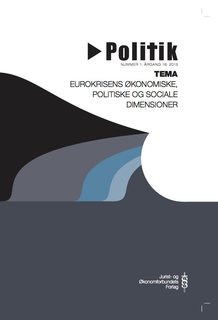Velkommen til Merkolland – legitimeringsstrategier i den offentlige debat om eurokrisen
DOI:
https://doi.org/10.7146/politik.v16i1.27534Resumé
The question of how to deal with the EU’s economic crisis is often reduced to two opposed positions: auster- ity measures vs. public investments, neatly represented by German Chancellor Angela Merkel and French President Francois Hollande, respectively. Merkel and Hollande also represent two di erent visions of EU- legitimacy in the broader sense: political integration vs. economic integration. at both the speci c and the general di erences between the two can be reconciled, is exempli ed by the European Council’s decisions to supplement the scal compact with a growth compact and to begin a process of political and economic reform. However, the proposed entwinement of political and economic legitimacy ignores the dimension of social legitimacy or solidarity among strangers, as Jürgen Habermas would put it. is paper explores how issues of identity and solidarity gure in the public debate about the Euro crisis. e main argument is that the politico-economic constitution of the EU as ‘Merkolland’ has, so far, rendered it a rather soulless place.
Downloads
Publiceret
Citation/Eksport
Nummer
Sektion
Licens
Forfattere, der publicerer deres værker via dette tidsskrift, accepterer følgende vilkår:
- Forfattere bevarer deres ophavsret og giver tidsskriftet ret til første publicering, samtidigt med at værket er omfattet af en Creative Commons Attribution-licens, der giver andre ret til at dele værket med en anerkendelse af værkets forfatter og første publicering i nærværende tidsskrift.
- Forfattere kan indgå flere separate kontraktlige aftaler om ikke-eksklusiv distribution af tidsskriftets publicerede version af værket (f.eks. sende det til et institutionslager eller udgive det i en bog), med en anerkendelse af værkets første publicering i nærværende tidsskrift.
- Forfattere har ret til og opfordres til at publicere deres værker online (f.eks. i institutionslagre eller på deres websted) forud for og under manuskriptprocessen, da dette kan føre til produktive udvekslinger, samt tidligere og større citater fra publicerede værker (se The Effect of Open Access).

